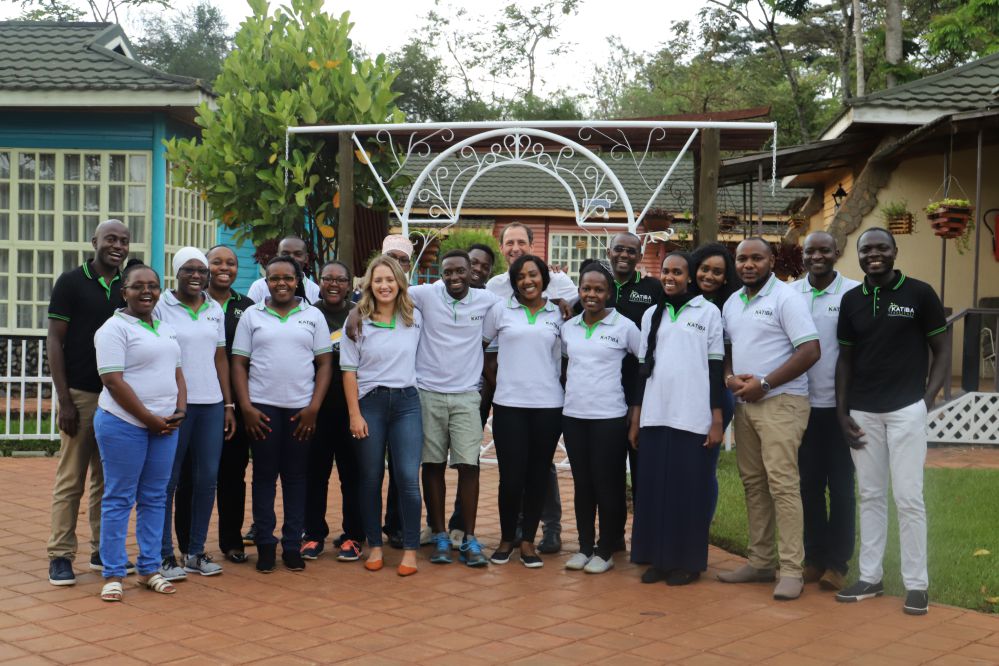 In the latest instalment of the DPRU's Q&A series with death penalty litigators working in the Global South, DPRU Project Manager Daniel Cullen speaks to Chris Kerkering, Litigation Manager at the Katiba Institute, about Katiba's work on the death penalty, his experiences of working on capital cases, and the prospects of Kenya moving from abolitionist de facto status to full abolition.
In the latest instalment of the DPRU's Q&A series with death penalty litigators working in the Global South, DPRU Project Manager Daniel Cullen speaks to Chris Kerkering, Litigation Manager at the Katiba Institute, about Katiba's work on the death penalty, his experiences of working on capital cases, and the prospects of Kenya moving from abolitionist de facto status to full abolition.
Could you tell us a little bit about the Katiba Institute's litigation practice and where the organization's work on capital cases fits within this?
The Katiba Institute is a general public interest litigation organisation, which also does other programme work and research work. Our litigation work is very broad and is primarily based on defending the Kenyan Constitution. Much of what we do in our litigation work centres around Chapter Four of the Constitution, which concerns fundamental rights and freedoms, and our work on capital cases fits within this.
In capital cases in Kenya, are there any patterns in terms of types of offences and the socioeconomic backgrounds of defendants?
In terms of offences, there are three major crimes for which people have been sentenced to the death penalty: murder, robbery with violence and attempted robbery with violence. The most common of these is robbery with violence.
The Katiba Institute does not represent any defendants directly, as we are usually looking at capital cases from the appellate perspective, concentrating on constitutional human rights issues. Overall, however, our impression is that the vast majority of those facing capital charges are very poor, from the lowest levels of poverty in Kenya.
Furthermore, almost all cases of robbery with violence and attempted robbery with violence would have been tried and convicted without the benefit of counsel. And although those convicted of murder in theory should have had counsel, there's no real system for ensuring that defendants do have effective legal representation.

The team at the Katiba Institute, Nairobi, Kenya
Please could you tell us about one of the most notable capital cases you've dealt with?
The most notable capital case that we have been involved in is Muruatetu v Republic (2017) at the Supreme Court of Kenya. Muruatetu was a case challenging the constitutionality of the mandatory death penalty. The appellants had been convicted of murder, and at the time Kenya had the mandatory death penalty for murder, robbery with violence and attempted robbery with violence.
In the Supreme Court’s judgment, it held that the mandatory death penalty was unconstitutional for murder. This was a historic ruling which impacted the cases of thousands of prisoners, making many eligible for resentencing. Subsequently, lower courts also applied this to cases of robbery with violence and attempted robbery with violence.
However, the waters have since been muddied about the extent to which the Muruatetu judgment applies to offences beyond murder. In 2021, the Supreme Court issued directions stating that Muruatetu only applied to murder. Since then, lower courts dealing with robbery with violence and attempted robbery with violence have been much more likely to impose the mandatory death penalty.
From our perspective, these later directions are not binding on lower courts, or at least should not be. Notwithstanding this, Muruatetu was a very significant case which really shifted the landscape in the criminal law in Kenya in many different respects.
Is there now a resentencing process underway for those who received mandatory death sentences?
There is no organised system for resentencing, although there are some NGOs who will help people to apply. The High Courts are dealing with resentencing applications on a case-by-case basis, but there were approximately 6-7,000 people convicted and sentenced to death under these laws, a volume that is so high that I don’t see how the resentencing could be done in my lifetime without some organised, concerted effort. We are currently contemplating how to move forward with the resentencing problem, including raising another court challenge or seeking funding to provide support for the process.
Kenya is an abolitionist de facto country which hasn't carried out an execution since 1987. How does that impact the cases that you've worked on?
I don’t think that Kenya’s de facto abolitionist status is relevant: if you have death penalty laws on the books, you can do it. If the government made the decision to move forward with executions, they could. The fact that they are de facto abolitionist has no bearing on the risks that the laws involve, so there is nothing to suggest that the policy couldn’t shift and executions start again.
The manifest injustice that results from Kenya’s death penalty laws is shocking; the number of people sentenced to death over the last 40 years is mind-boggling. Abolitionist de facto status also means that the death penalty can be ignored, and if executions aren’t imminent, people tend to forget about it or minimise it.
What do you think are the prospects of abolition in Kenya in the coming years?
There is currently a Bill in the Kenyan Parliament to partially abolish the death penalty. It essentially takes the death penalty off the table for murder, robbery with violence, attempted robbery with violence and a few other charges. It doesn't get rid of it entirely, and in particular it is maintained for treason. But the Bill is good progress, and the fact that you can have it being debated in Parliament would not have been possible five or six years ago.
Our concern is that there may be only a partial abolition or the replacement of death sentences with life imprisonment, which is of course better, but it is important that each prisoner receives individualised sentencing based on their circumstances and offence, rather than simply swapping one sentence for another en masse.
What is your view on the use of presidential pardons, which have been quite frequent over recent decades?
I think that Kenya uses presidential pardons to reduce the numbers of death row prisoners and decrease scrutiny from human rights organisations. Once you have thousands of death row prisoners, then human rights organisations are reporting this and it looks bad. If you do a mass pardon, all of a sudden those numbers are down. When Kenya is asked to report on its human rights situation, the death penalty and the numbers of people on death row always comes up, so this is a way of skirting it.
How did you come to be working on capital cases? And was this something you envisaged when beginning your legal training?
The first capital case I worked on was as a law clerk in the US, in my first year out of law school, when the judge I was clerking for had a death penalty trial. In going through that trial, it was like the world turned sideways. I found the rationalised debates about whether to kill someone just insane. I could not shake the way that this was sort of trying to be cleansed through the legal process and how that almost made it worse.
Later, I started doing criminal defence work, working for federal public defender organisations, and I was definitely drawn to capital cases. Most of the work I did in the US was appellate work, challenging convictions of people who were sentenced to death.
What motivates you to continue working on capital cases?
There's something about the intersection between the messy humanity of criminal law, and who we are as a society and what we're willing to accommodate, that I've found very fascinating and challenging. You observe the machinery of the state being used in such indiscriminate ways. And more and more, I have found value in reaffirming the humanity of people who've been convicted of pretty awful things. I just love doing the work, and I think that that really keeps you motivated.
What are the biggest challenges you face as a lawyer working on capital cases in Kenya?
The biggest challenge is that in Kenya there is no public defender system or free criminal representation. You can feel very isolated and the rationale behind what you’re doing is not recognised. Because of this, you also see so much harm being done without it being recognised or acknowledged, officially, and I think that that indifference to the plight of all the criminally accused – not just those who are facing the death penalty – is appalling. I think I would just not sleep at night if I weren't doing something to try to address it.
What advice would you give to aspiring lawyers who might like to work on capital cases in the future?
If you want to do it, do it, because I think it's absolutely fascinating. It brings out some of the more compelling and challenging aspects of being a lawyer, which is really about translating highfalutin theory to intractable messes. Nothing does that more than working on death penalty cases.
What I think is necessary is to have a very open mind, because you do need to acknowledge the impact that a crime that normally gets the death penalty has and consider it from every possible angle. The emotional process involved can also be really tough, and you have to be a deep thinker about this.
The other thing is that you have to know this is that the fight against the death penalty is a 50, 60, 70-year fight. These things aren't necessarily going to change in our lifetime. You can't think you're going to win, you have to think you're going to chip away so that eventually it will fall. And it might not be the one chip that you put into the monolith that does it, but you need to know that it's about continuing. And that doesn't mean you don't fight the individual battle, but you also know that you have to pick yourself up and move on, even after devastating losses.
Chris Kerkering is Litigation Manager at the Katiba Institute in Nairobi, Kenya. He is an attorney licensed in the United States. Following law school, Chris clerked for two US judges, drafting legal opinions in all areas of law, after which he spent seven years working as a lawyer for the Federal Public Defender, where he represented indigent defendants in criminal cases. Chris moved to Nairobi with his family in 2013, where he began working on issues relating to good governance and rule of law in the region, with a focus on Somalia and Kenya.
Share:
